Thomas James Richards, Diaries, Transcript Vol. 1, 26 August 1914 to 24 April 1915 - Part 19
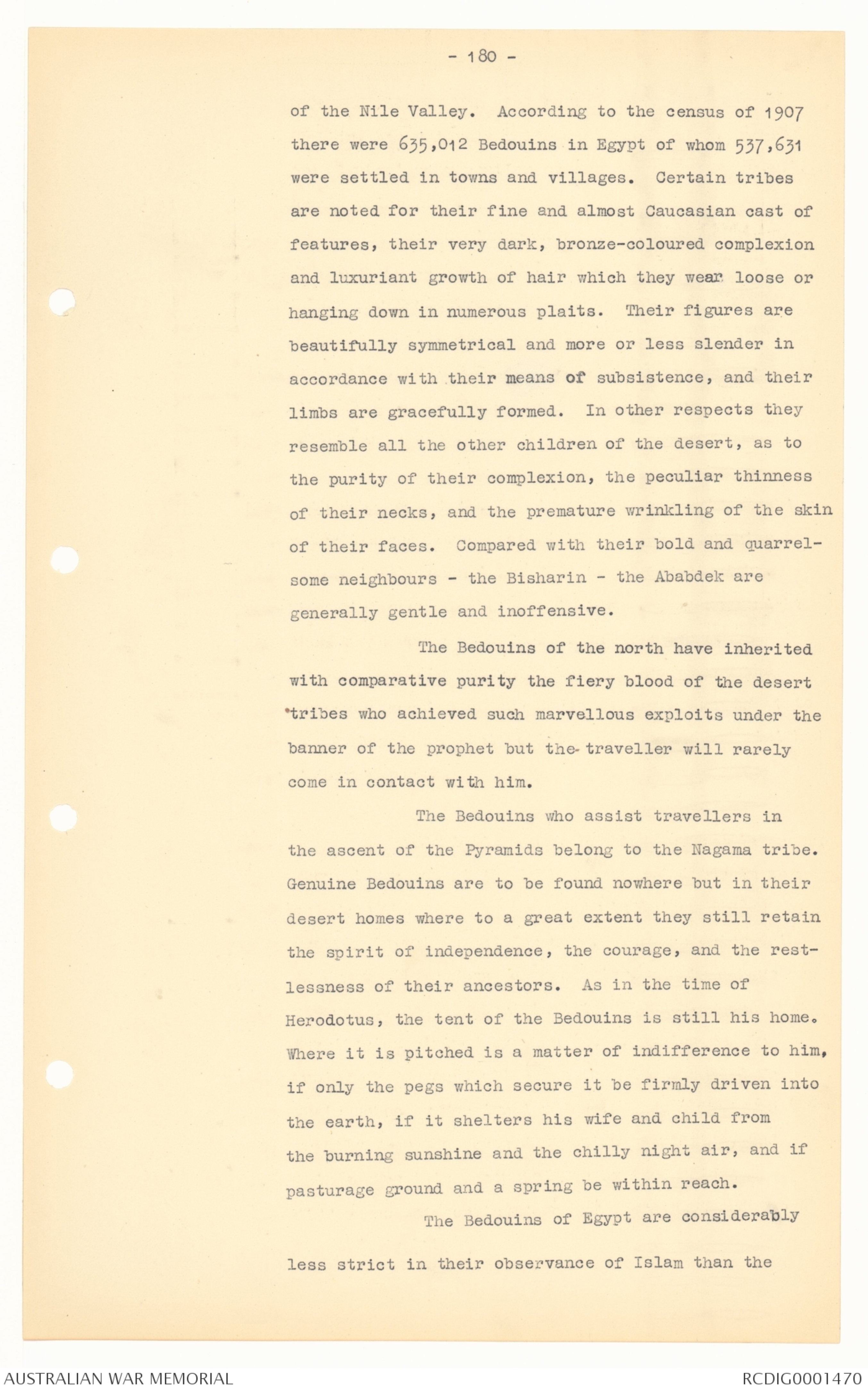
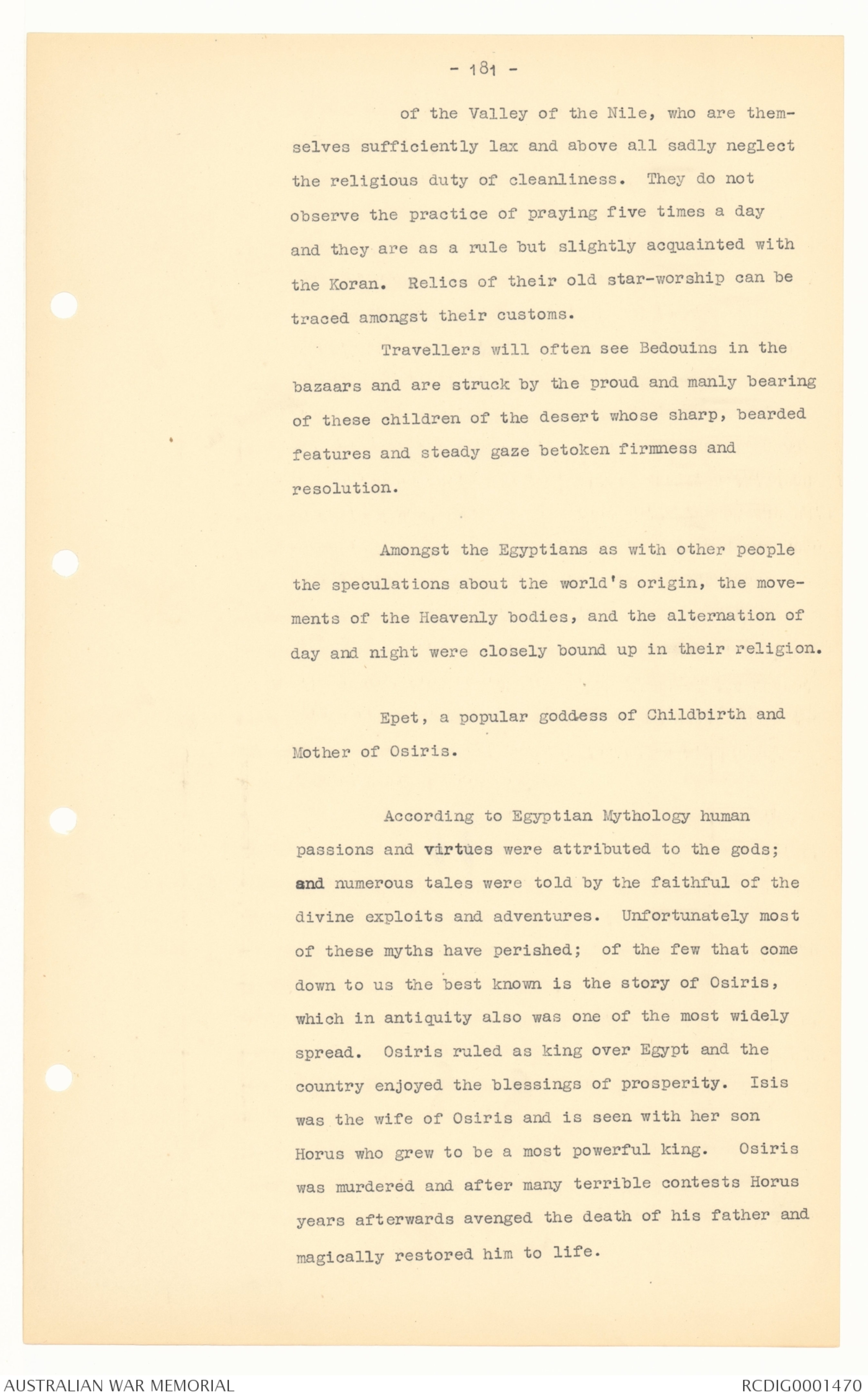
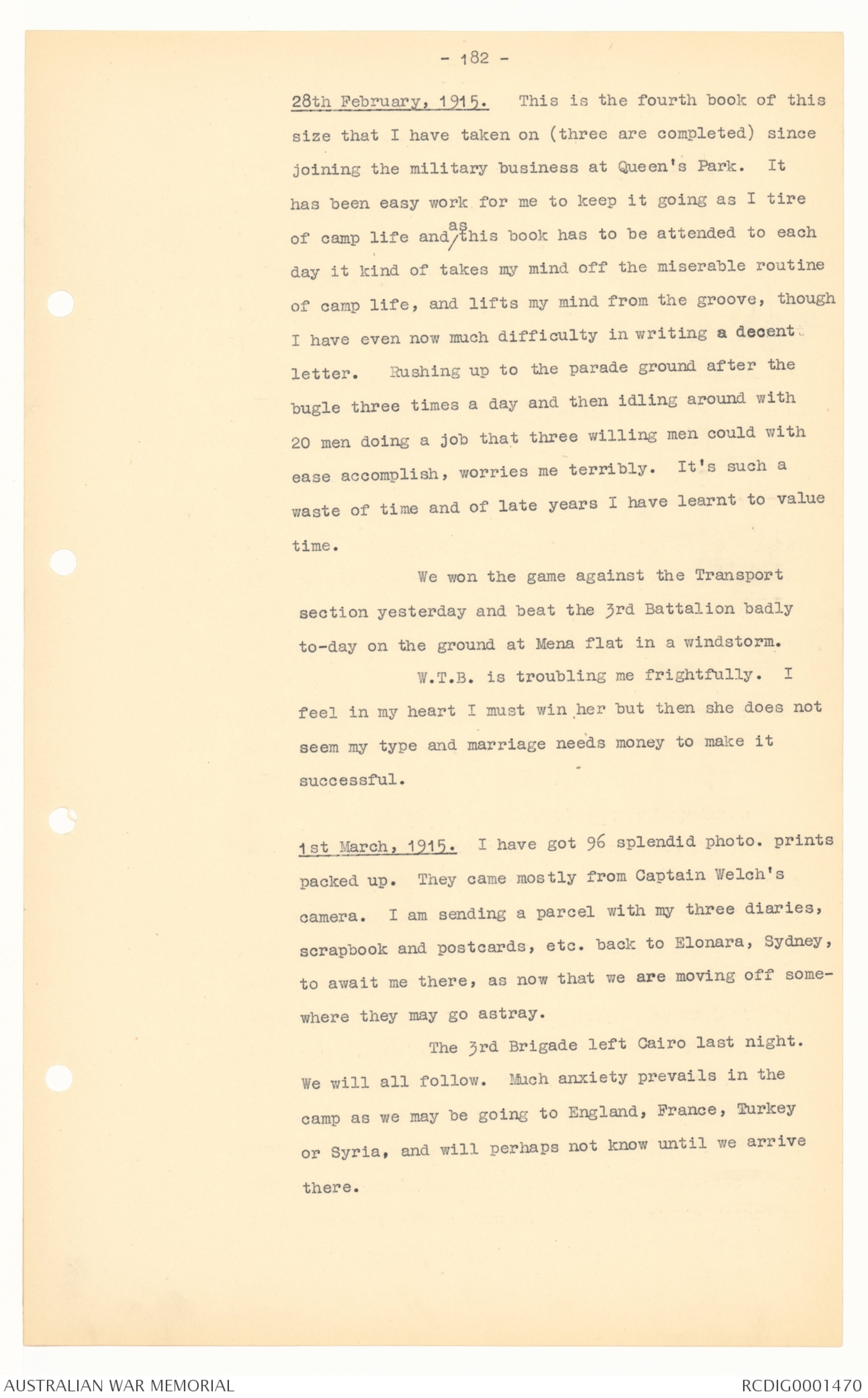
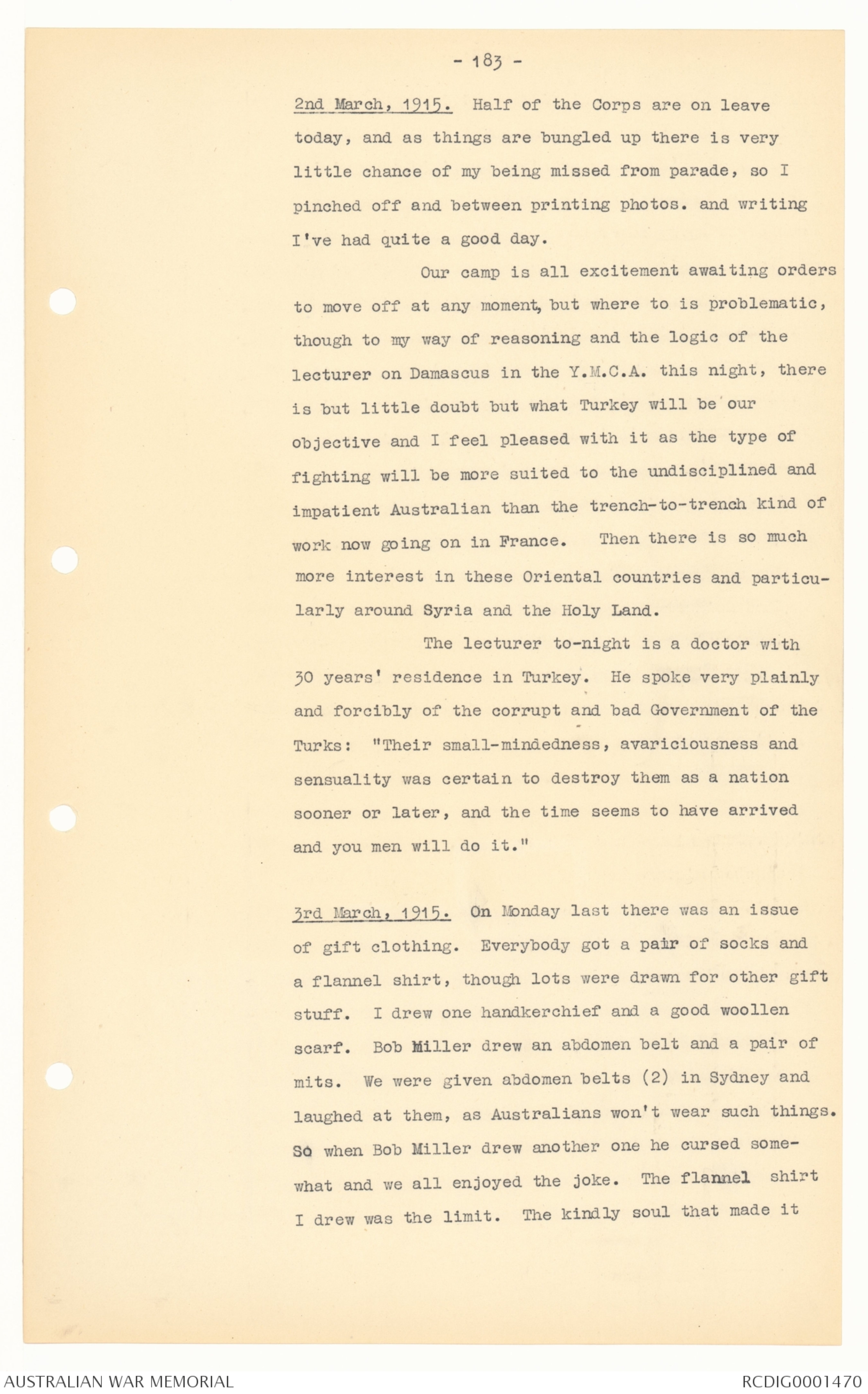
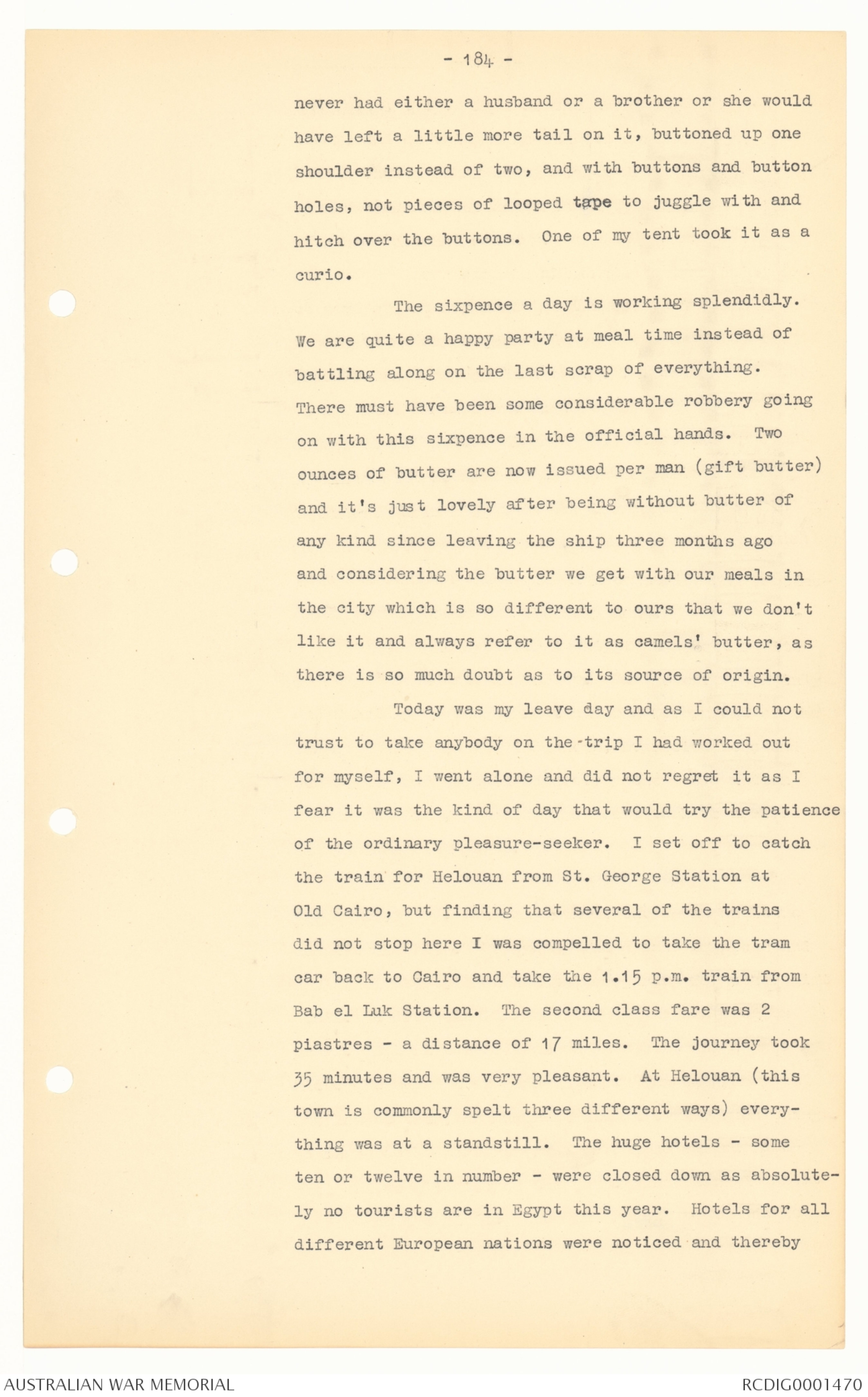
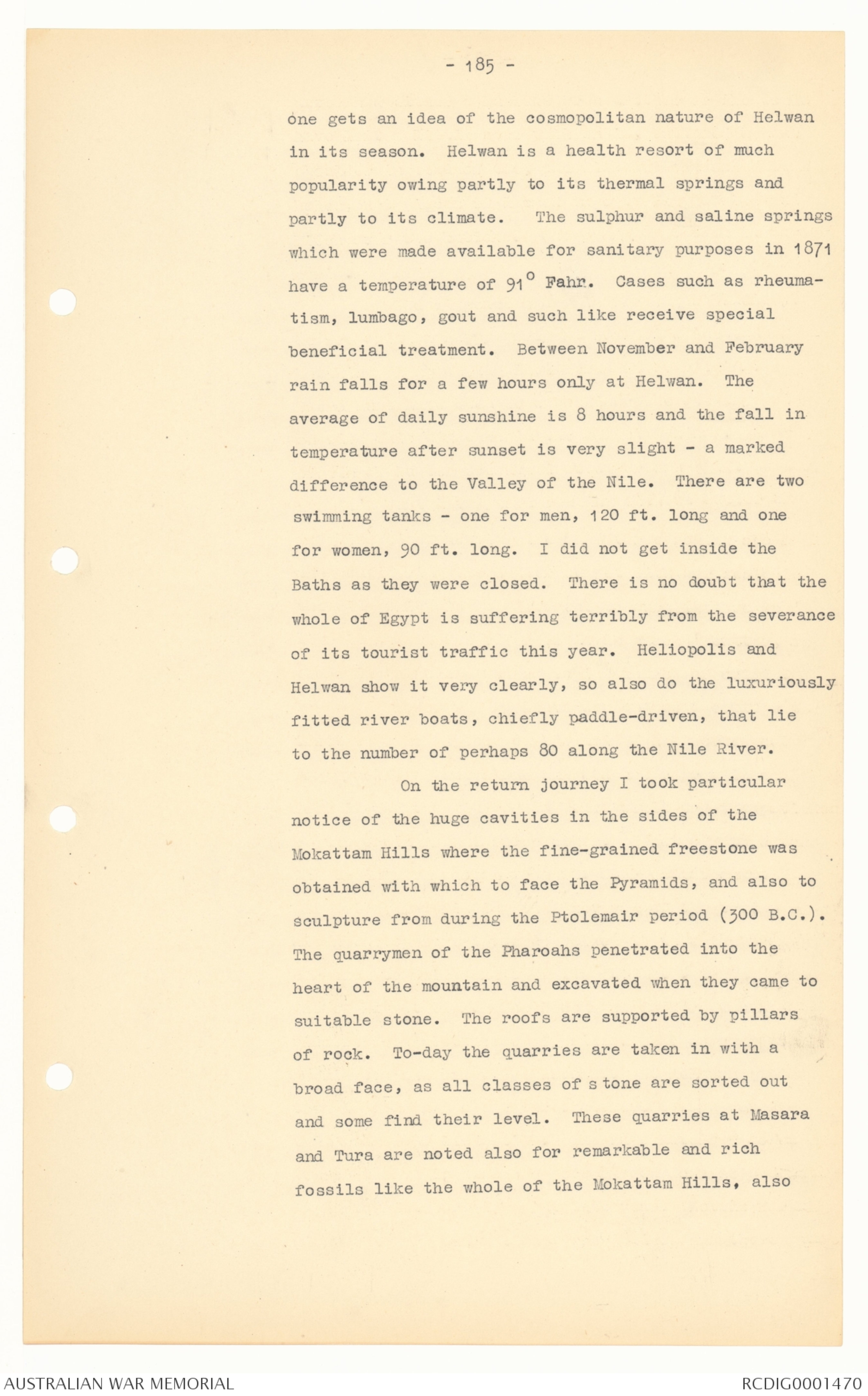
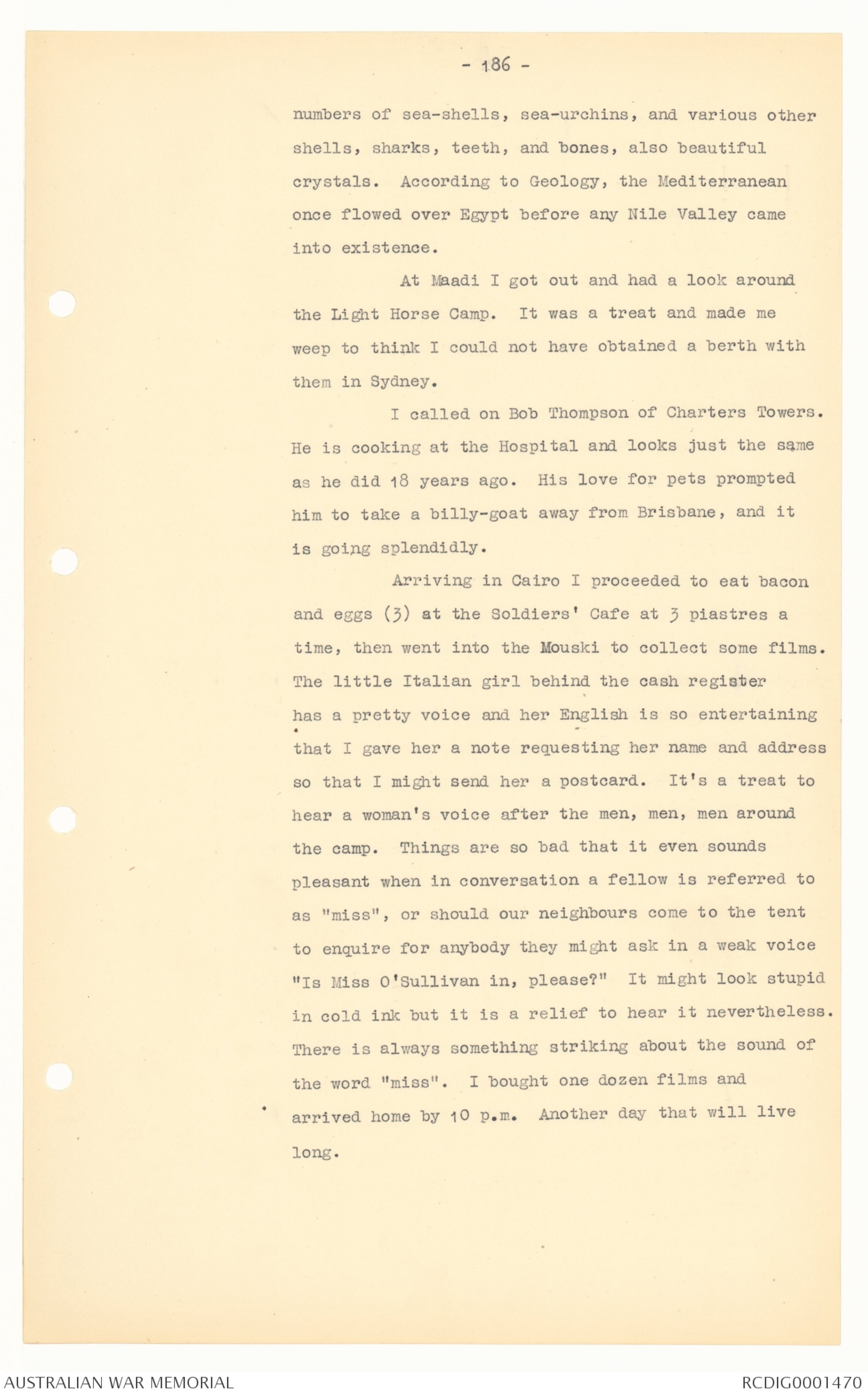
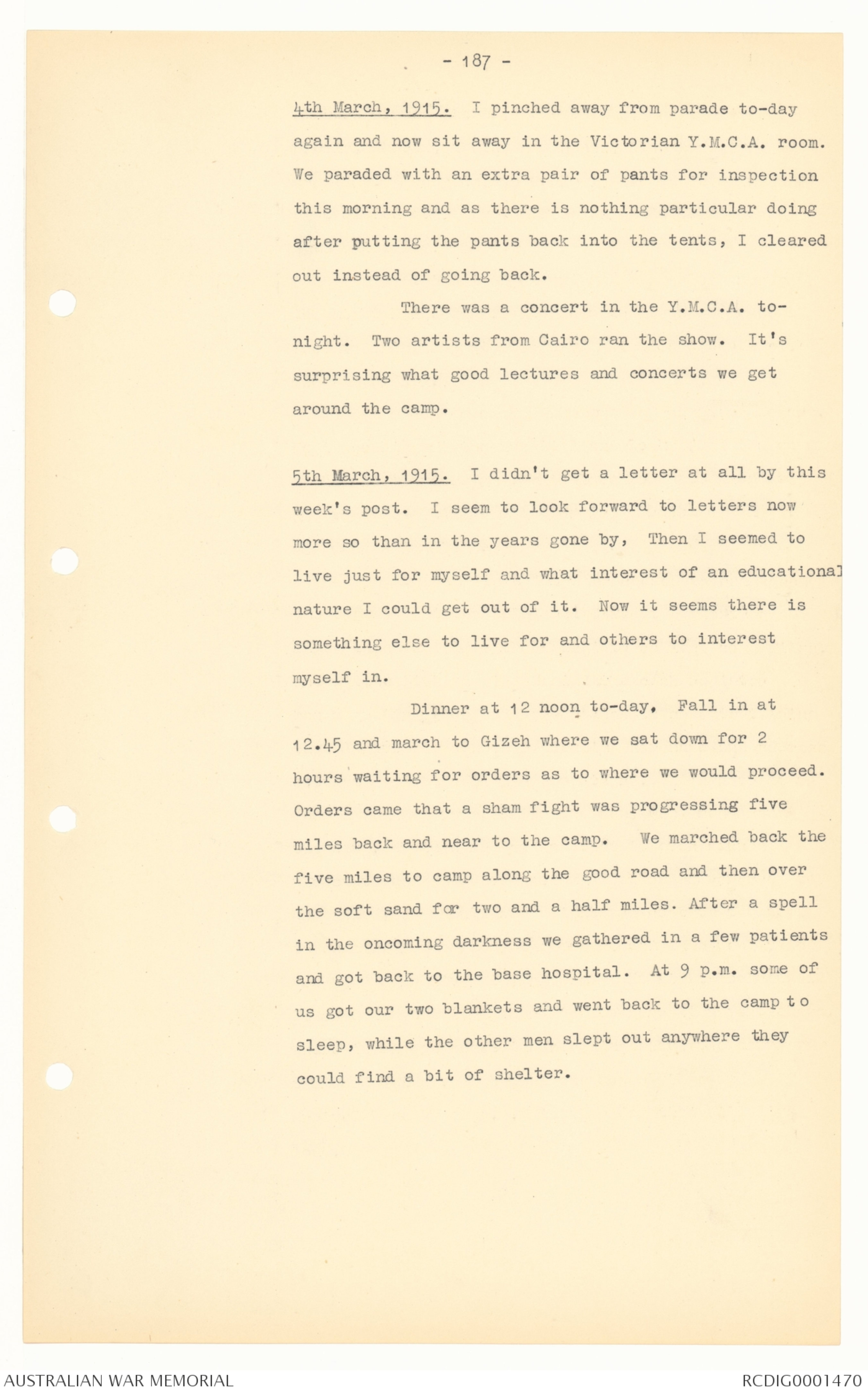
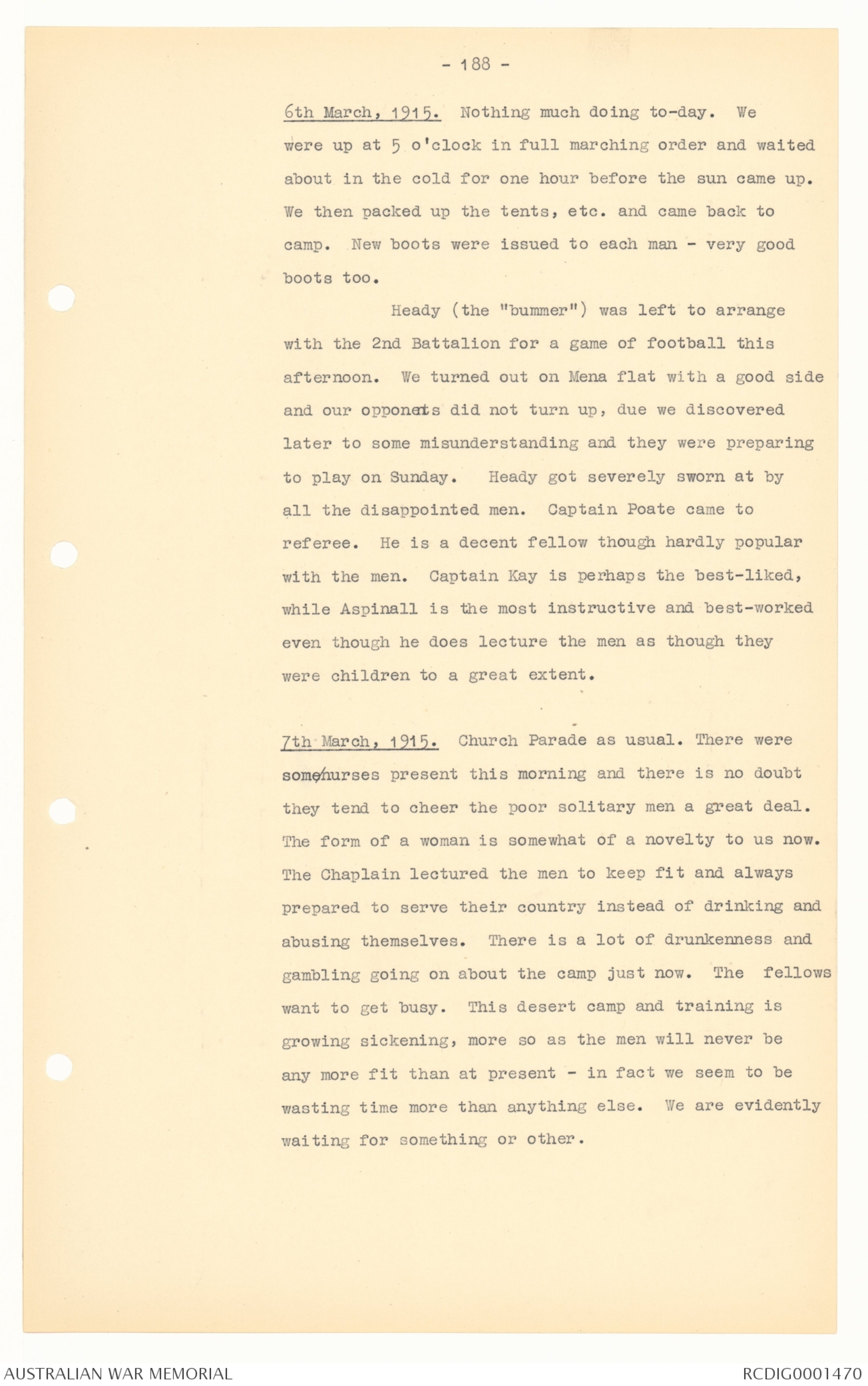
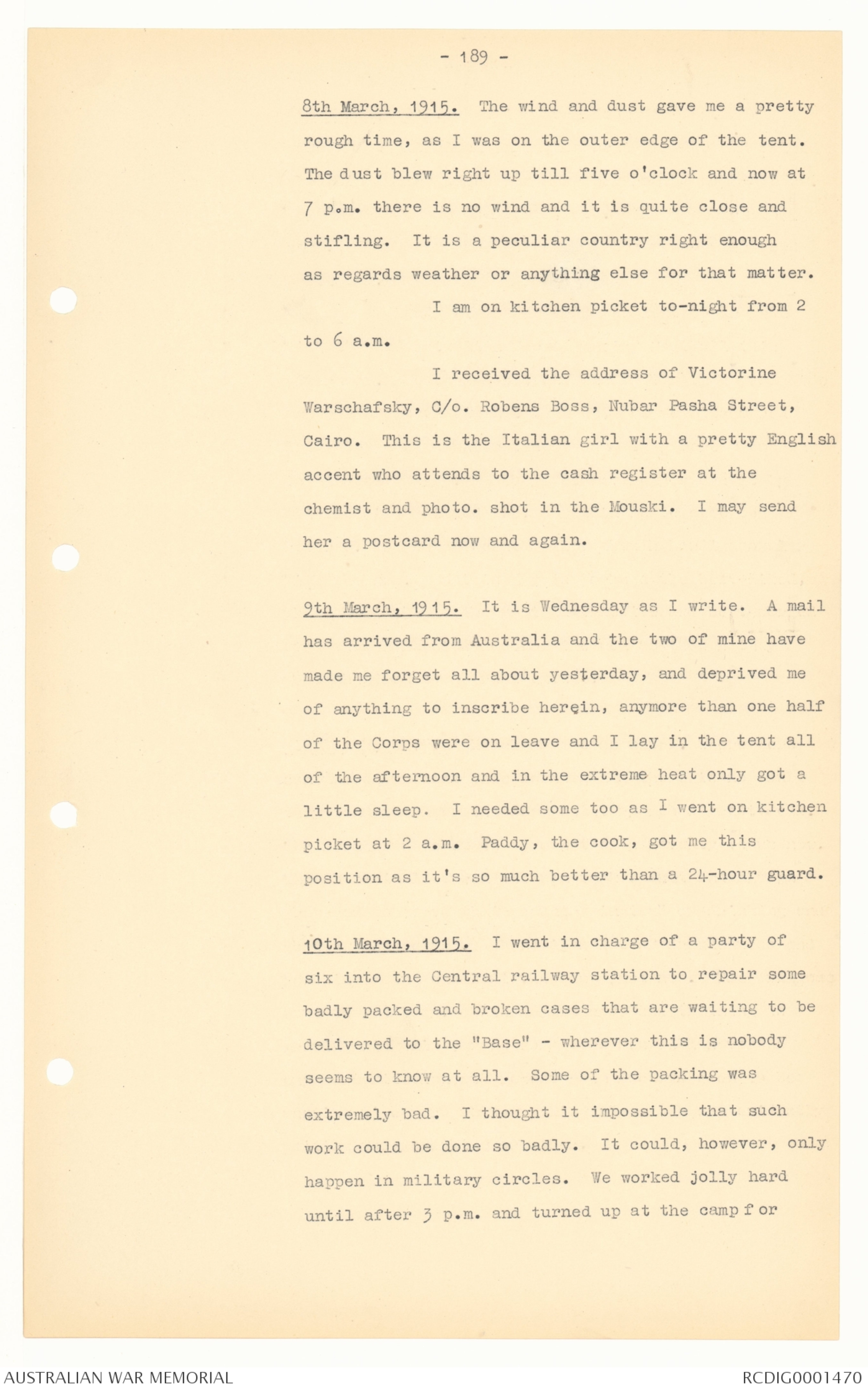
- 180 -
of the Nile Valley. According to the census of 1907
there were 635,012 Bedouins in Egypt of whom 537,631
were settled in towns and villages. Certain tribes
are noted for their fine and almost Caucasian cast of
features, their very dark, bronze-coloured complexion
and luxuriant growth of hair which they wear loose or
hanging down in numerous plaits. Their figures are
beautifully symmetrical and more or less slender in
accordance with their means of subsistence, and their
limbs are gracefully formed. In other respects they
resemble all the other children of the desert, as to
the purity of their complexion, the peculiar thinness
of their necks, and the premature wrinkling of the skin
of their faces. Compared with their bold and quarrelsome
neighbours - the Bisharin - the Ababdek are
generally gentle and inoffensive.
The Bedouins of the north have inherited
with comparative purity the fiery blood of the desert
tribes who achieved such marvellous exploits under the
banner of the prophet but the traveller will rarely
come in contact with him.
The Bedouins who assist travellers in
the ascent of the Pyramids belong to the Nagama tribe.
Genuine Bedouins are to be found nowhere but in their
desert homes where to a great extent they still retain
the spirit of independence, the courage, and the restlessness
of their ancestors. As in the time of
Herodotus, the tent of the Bedouins is still his home.
Where it is pitched is a matter of indifference to him,
if only the pegs which secure it be firmly driven into
the earth, if it shelters his wife and child from
the burning sunshine and the chilly night air, and if
pasturage ground and a spring be within reach.
The Bedouins of Egypt are considerably
less strict in their observance of Islam than the
- 181 -
of the Valley of the Nile, who are themselves
sufficiently lax and above all sadly neglect
the religious duty of cleanliness. They do not
observe the practice of praying five times a day
and they are as a rule but slightly acquainted with
the Koran. Relics of their old star-worship can be
traced amongst their customs.
Travellers will often see Bedouins in the
bazaars and are struck by the proud and manly bearing
of these children of the desert whose sharp, bearded
features and steady gaze betoken firmness and
resolution.
Amongst the Egyptians as with other people
the speculations about the world's origin, the movements
of the Heavenly bodies, and the alternation of
day and night were closely bound up in their religion.
Epet, a popular goddess of Childbirth and
Mother of Osiris.
According to Egypt Mythology human
passions and virtues were attributed to the gods;
and numerous tales were told by the faithful of the
divine exploits and adventures. Unfortunately most
of these myths have perished; of the few that come
down to us the best known is the story of Osiris,
which in antiquity also was one of the most widely
spread. Osiris ruled as king over Egypt and the
country enjoyed the blessings of prosperity. Isis
was the wife of Osiris and is seen with her son
Horus who grew to be a most powerful king. Osiris
was murdered and after many terrible contests Horus
years afterwards avenged the death of his father and
magically restored him to life.
- 182 -
28th February, 1915. This is the fourth book of this
size that I have taken on (three are completed) since
joining the military business at Queen's Park. It
has been easy work for me to keep it going as I tire
of camp life and ^as this book has to be attended to each
day it kind of takes my mind off the miserable routine
of camp life, and lifts my mind from the groove, though
I have even now much difficulty in writing a decent
letter. Rushing up to the parade ground after the
bugle three times a day and then idling around with
20 men doing a job that three willing men could with
ease accomplish, worries terribly. It's such a
waste of time and of late years I have learnt to value
time.
We won the game against the Transport
section yesterday and beat the 3rd Battalion badly
to-day on the ground at Mena flat in a windstorm.
W.T.B. is troubling me frightfully. I
feel in my heart I must win her but then she does not
seem my type and marriage needs money to make it
successful.
1st March, 1915. I have got 96 splendid photo. prints
packed up. They came mostly from Captain Welch's
camera. I am sending a parcel with my three diaries,
scrapbook and postcards, etc. back to Elonara, Sydney,
to await me there, as now that we are moving off somewhere
they may go astray.
The 3rd Brigade left Cairo last night.
We will all follow. Much anxiety prevails in the
camp as we may be going to England, France, Turkey
or Syria, and will perhaps not know until we arrive
there.
- 183 -
2nd March, 1915. Half of the Corps are on leave
today, and as things are bungled up there is very
little chance of my being missed from parade, so I
pinched off and between printing photos. and writing
I've had quite a good day.
Our camp is all excitement awaiting orders
to move off at any moment, but where to is problematic,
though to my way of reasoning and the logic of the
lecturer on Damascus in the Y.M.C.A. this night, there
is but little doubt but what Turkey will be our
objective and I feel pleased with it as the type of
fighting will be more suited to the undisciplined and
impatient Australian than the trench-to-trench kind of
work now going on in France. Then there is so much
more interest in these Oriental countries and particularly
around Syria and the Holy Land.
The lecturer to-night is a doctor with
30 years' residence in Turkey. He spoke very plainly
and forcibly of the corrupt and bad Government of the
Turks: "Their small-mindedness, avariciousness and
sensuality was certain to destroy them as a nation
sooner or later, and the time seems to have arrived
and you men will do it."
3rd March, 1915. On Monday last there was an issue
of gift clothing. Everybody got a pair of socks and
a flannel shirt, though lots were drawn for other gift
stuff. I drew one handkerchief and a good woollen
scarf. Bob Miller drew an abdomen belt and a pair of
mits. We were given abdomen belts (2) in Sydney and
laughed at them, as Australians won't wear such things.
So when Bob Miller drew another one he cursed somewhat
and we all enjoyed the joke. The flannel shirt
I drew was the limit. The kindly soul that made it
- 184 -
never had either a husband or a brother or she would
have left a little more tail on it, buttoned up one
shoulder instead of two, and with buttons and button
holes, not pieces of looped tape to juggle with and
hitch over the buttons. One of my tent took it as a
curio.
The sixpence a day is working splendidly.
We are quite happy party at meal time instead of
battling along on the last scrap of everything.
There must have been some considerable robbery going
on with this sixpence in the official hands. Two
ounces of butter are now issued per man (gift butter)
and it's just lovely after being without butter of
any kind since leaving the ship three months ago
and considering the butter we get with our meals in
the city which is so different to ours that we don't
like it and always refer to it as camel's butter, as
there is so much doubt as to its source of origin.
Today was my leave day and as I could not
trust to take anybody on the trip I had worked out
for myself, I went alone and did not regret it as I
fear it was the kind of day that would try the patience
of the ordinary pleasure-seeker. I set off to catch
the train for Helouan from St. George Station at
Old Cairo, but finding that several of the trains
did not stop here I was compelled to take the tram
car back to Cairo and take the 1.15 p.m. train from
Bab el Luk Station. The second class fare was 2
piastres - a distance of 17 miles. The journey took
35 minutes and was very pleasant. At Helouan (this
town is commonly spelt three different ways) everything
was at a standstill. The huge hotels - some
ten or twelve in number - were closed down as absolutely
no tourists are in Egypt this year. Hotels for all
different European nations were noticed and thereby
- 185 -
one gets an idea of the cosmopolitan nature of Helwan
in its season. Helwan is a health resort of much
popularity owing partly to its thermal springs and
partly to its climate. The sulphur and saline springs
which were made available for sanitary purposes in 1871
have a temperature of 91o Fahr. Cases such as rheumatism,
lumbago, gout and such like receive special
beneficial treatment. Between November and February
rain falls for a few hours only at Helwan. The
average of daily sunshine is 8 hours and the fall in
temperature after sunset is very slight - a marked
difference to the Valley of the Nile. There are two
swimming tanks - one for men, 120 ft. long and one
for women, 90 ft. long. I did not get inside the
Baths as they were closed. There is no doubt that the
whole of Egypt is suffering terribly from the severance
of its tourist traffic this year. Heliopolis and
Helwan show it very clearly, so also do the luxuriously
fitted river boats, chiefly paddle-driven, that lie
to the number of perhaps 80 along the Nile River.
On the return journey I took particular
notice of the huge cavities in the sides of the
Mokattam Hills where the fine-grained freestone was
obtained with which to face the Pyramids, and also to
sculpture from during the Ptolemair period (300 B.C.).
The quarrymen of the Pharoahs penetrated into the
heart of the mountain and excavated when they came to
suitable stone. The roofs are supported by pillars
of rock. To-day the quarries are taken in with a
broad face, as all classes of stone are sorted out
and some find their level. These quarries at Masara
and Tura are noted also for remarkable and rich
fossils like the whole of the Mokattam Hills, also
- 186 -
members of sea-shells, sea-urchins, and various other
shells, sharks, teeth, and bones, also beautiful
crystals. According to Geology, the Mediterranean
once flowed over Egypt before any Nile Valley came
into existence.
At Maadi I got out and had a look around
the Light Horse Camp. It was a treat and made me
weep to think I could not have obtained a berth with
them in Sydney.
I called on Bob Thompson of Charters Towers.
He is cooking at the Hospital and looks just the same
as he did 18 years ago. His love for pets prompted
him to take a billy-goat away from Brisbane, and it
is going splendidly.
Arriving in Cairo I proceeded to eat bacon
and eggs (3) at the Soldiers' Cafe at 3 piastres a
time, then went into the Mouski to collect some films.
The little Italian girl behind the cash register
has a pretty voice and her English is so entertaining
that I gave her a note requesting her name and address
so that I might send her a postcard. It's a treat to
hear a woman's voice after the men, men, men, around
the camp. Things are so bad that it even sounds
pleasant when in conversation a fellow is referred to
as "miss", or should our neighbours come to the tent
to enquire for anybody they might ask in a weak voice
"Is Miss O'Sullivan in, please?" It might look stupid
in cold ink but it is a relief to hear it nevertheless.
There is always something striking about the sound of
the word "miss". I bought one dozen films and
arrived home by 10 p.m. Another day that will live
long.
- 187 -
4th March, 1915. I pinched away from parade to-day
again and now sit away in the Victorian Y.M.C.A. room.
We paraded with an extra pair of pants for inspection
this morning and as there is nothing particular doing
after putting the pants back into the tents, I cleared
out instead of going back.
There was a concert in the Y.M.C.A. tonight.
Two artists from Cairo ran the show. It's
surprising what good lectures and concerts we get
around the camp.
5th March, 1915. I didn't get a letter at all by this
week's post. I seem to look forward to letters now
more so than in the years gone by, Then I seemed to
live just for myself and what interest of an educational
nature I could get out of it. Now it seems there is
something else to live for and others to interest
myself in.
Dinner at 12 noon to-day. Fall in at
12.45 and march to Gizeh where we sat down for 2
hours waiting for orders as to where we would proceed.
Orders came that a sham fight was progressing five
miles back and near to the camp. We marched back the
five miles to camp along the good road and then over
the soft sand for two and a half miles. After a spell
in the oncoming darkness we gathered in a few patients
and got back to the base hospital. At 9 p.m. some of
us got out two blankets and went back to the camp to
sleep, while the other men slept out anywhere they
could find a bit of shelter.
- 188 -
6th March, 1915. Nothing much doing to-day. We
were up at 5 o'clock in full marching order and waited
about in the cold for one hour before the sun came up.
We then packed up the tents, etc. and came back to
camp. New boots were issued to each man - very good
boots too.
Heady (the "bummer") was left to arrange
with the 2nd Battalion for a game of football this
afternoon. We turned out on Mena flat with a good side
and our opponents did not turn up, due we discovered
later to some misunderstanding and they were preparing
to play on Sunday. Heady got severely sworn at by
all the disappointed men Captain Poate came to
referee. He is a decent fellow though hardly popular
with the men. Captain Kay is perhaps the best-liked
while Aspinall is the most instructive and best-worked
even though he does lecture the men as though they
were children to a great extent.
7th March, 1915. Church Parade as usual. There were
some/nurses present this morning and there is no doubt
they tend to cheer the poor solitary men a great deal.
The form of a woman is somewhat of a novelty to us now.
The Chaplain lectured the men to keep fit and always
prepared to serve their country instead of drinking and
abusing themselves. There is a lot of drunkenness and
gambling going on about the camp just now. The fellows
want to get busy. This desert camp and training is
growing sickening, more so as the men will never be
any more fit than at present - in fact we seem to be
wasting time more than anything else. We are evidently
waiting for something or other.
- 189 -
8th March, 1915. The wind and dust gave me a pretty
rough time, as I was on the outer edge of the tent.
The dust blew right up till five o'clock and now at
7 p.m. there is no wind and it is quite close and
stifling. It is a peculiar country right enough
as regards weather or anything else for that matter.
I am on kitchen picket to-night from 2
to 6 a.m.
I received the address of Victorine
Warschafsky, C/o Robens Boss, Nubar Pasha Street,
Cairo. This is the Italian girl with a pretty English
accent who attends to the cash register at the
chemist and photo. shot in the Mouski. I may send
her a postcard now and again.
9th March, 1915. It is Wednesday as I write. A mail
has arrived from Australia and the two of mine have
made me forget all about yesterday, and deprived me
of anything to inscribe herein, anymore than one half
of the Corps were on leave and I lay in the tent all
of the afternoon and in the extreme heat only got a
little sleep. I needed some too as I went on kitchen
picket at 2 a.m. Paddy, the cook, got me this
position as it's so much better than a 24-hour guard.
10th March, 1915. I went in charge of a party of
six into the Central railway station to repair some
badly packed and broken cases that are waiting to be
delivered to the "Base" - wherever this is nobody
seems to know at all. Some of the packing was
extremely bad. I thought it impossible that such
work could be done so badly. It could, however, only
happen in military circles. We worked jolly hard
until after 3 p.m. and turned up at the camp f or
 Not Yet Replaced By AI
Not Yet Replaced By AIThis transcription item is now locked to you for editing. To release the lock either Save your changes or Cancel.
This lock will be automatically released after 60 minutes of inactivity.